Principles and Practice of Leadership and Management Coursework Report
VerifiedAdded on 2020/02/03
|14
|3801
|71
Report
AI Summary
This report provides an analysis of leadership and management principles, covering various theories, skills, and competencies. It begins with an introduction to leadership theories, including trait theory, and discusses essential leadership competencies such as fostering communication, integrity, openness to experience, creativity, and trust. The report then explores different leadership styles, including autocratic, democratic, and charismatic approaches, and examines the application of contingency theory. The second coursework delves into behavioral, transactional, and transformational leadership theories, along with the leader-member exchange theory and follower ship. It also discusses the skills and competencies necessary for successful leadership within organizations such as PepsiCo, emphasizing the importance of passion, positive attitude, and adaptability. The report concludes by highlighting the limitations of certain leadership theories and advocating for continuous learning and reinvention in leadership practices.
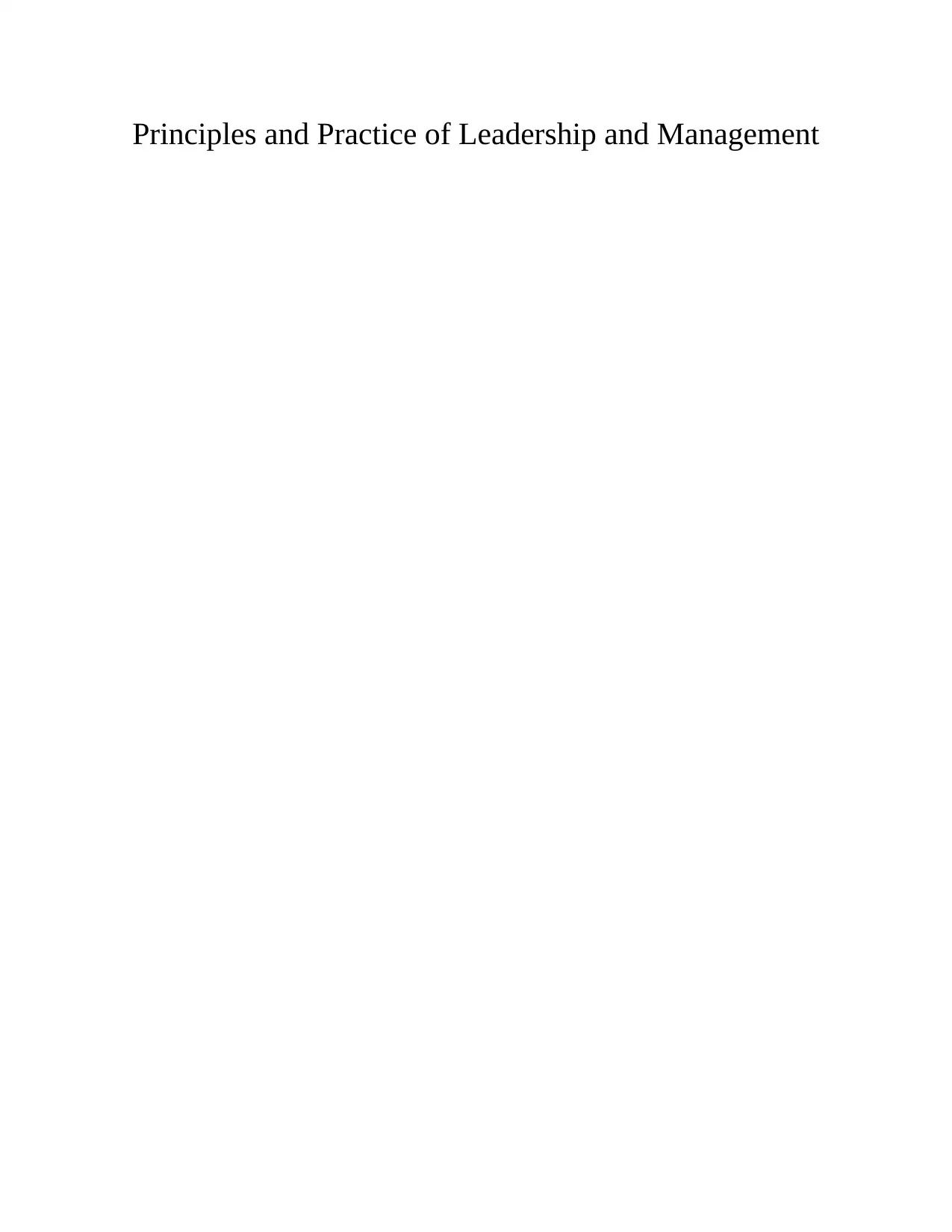
Principles and Practice of Leadership and Management
Paraphrase This Document
Need a fresh take? Get an instant paraphrase of this document with our AI Paraphraser
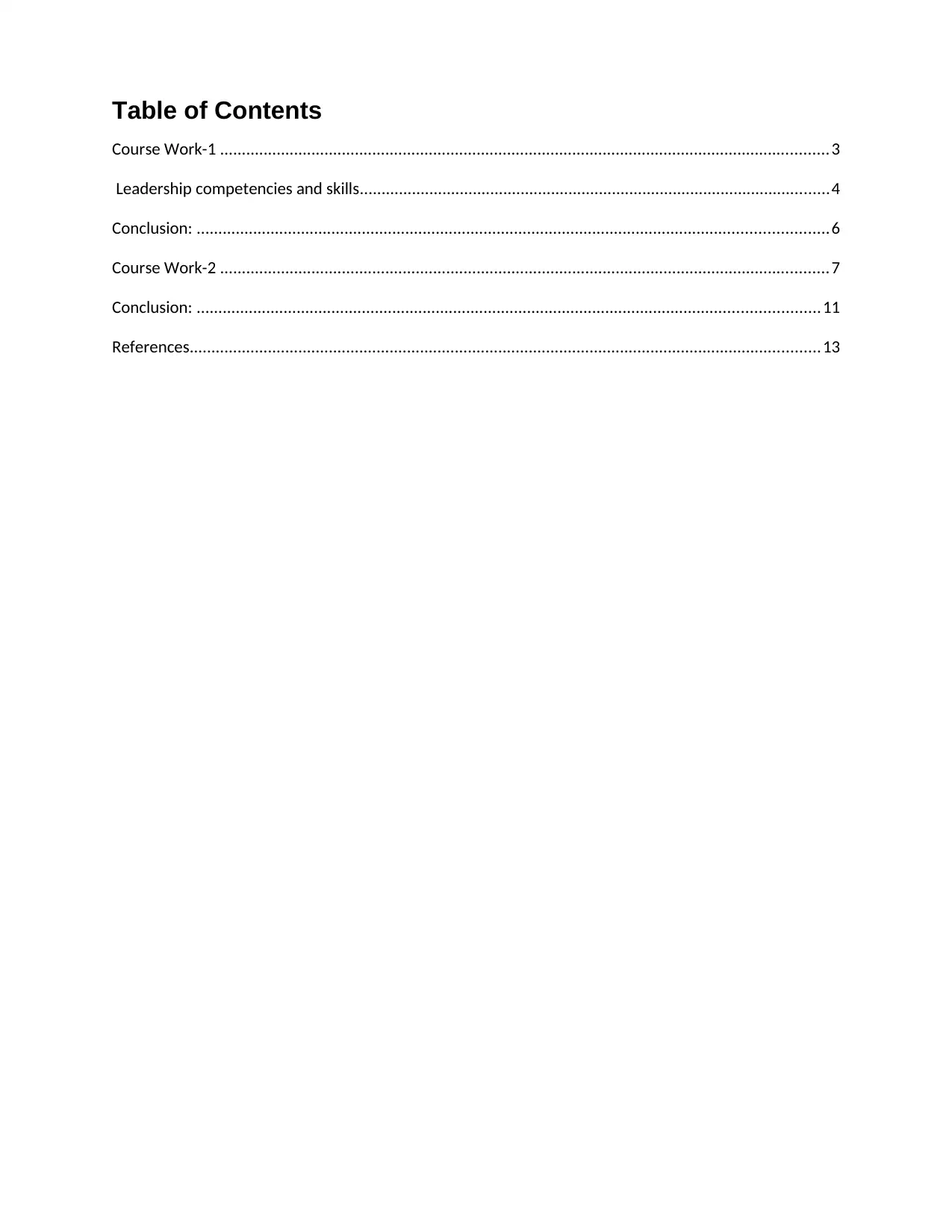
Table of Contents
Course Work-1 ............................................................................................................................................3
Leadership competencies and skills............................................................................................................4
Conclusion: .................................................................................................................................................6
Course Work-2 ............................................................................................................................................7
Conclusion: ...............................................................................................................................................11
References.................................................................................................................................................13
Course Work-1 ............................................................................................................................................3
Leadership competencies and skills............................................................................................................4
Conclusion: .................................................................................................................................................6
Course Work-2 ............................................................................................................................................7
Conclusion: ...............................................................................................................................................11
References.................................................................................................................................................13
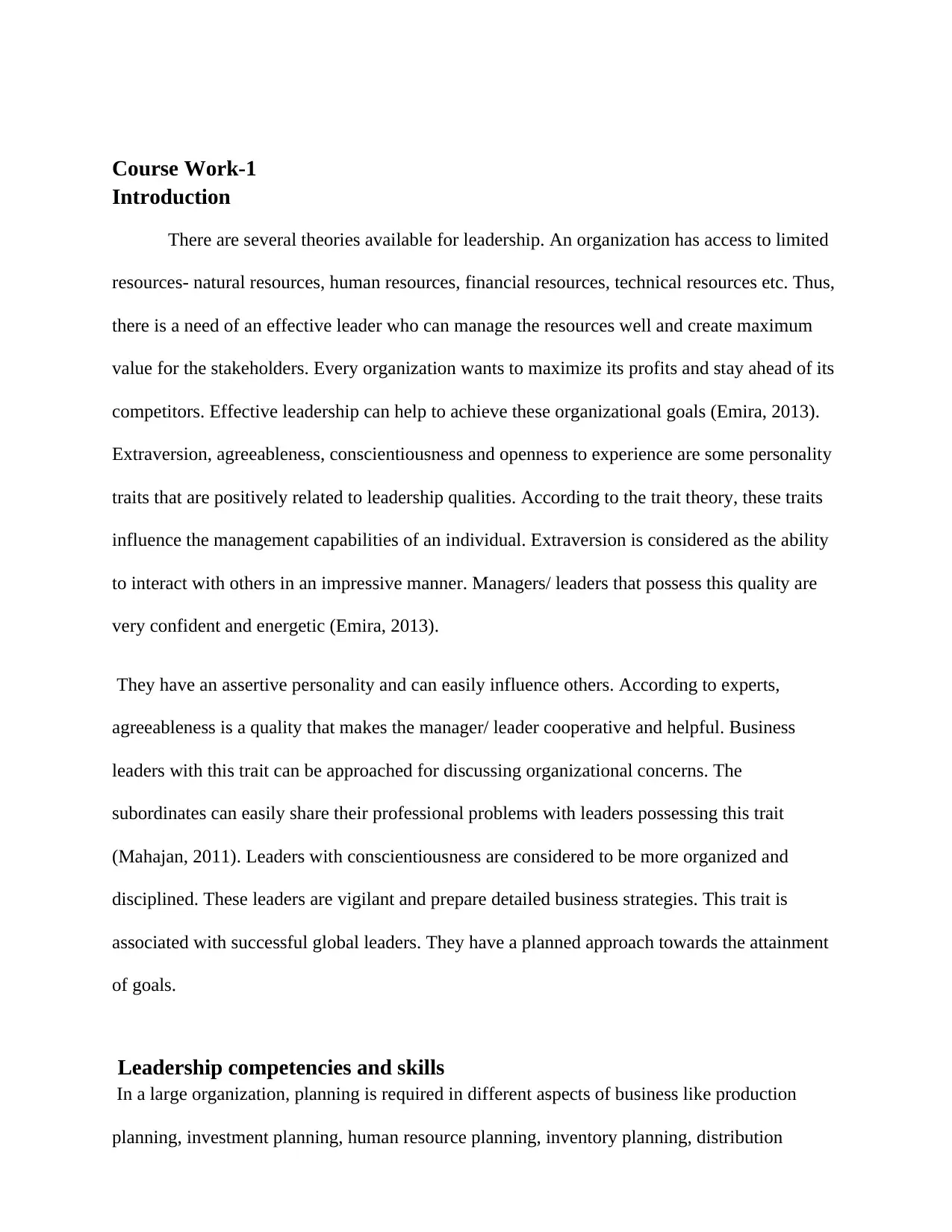
Course Work-1
Introduction
There are several theories available for leadership. An organization has access to limited
resources- natural resources, human resources, financial resources, technical resources etc. Thus,
there is a need of an effective leader who can manage the resources well and create maximum
value for the stakeholders. Every organization wants to maximize its profits and stay ahead of its
competitors. Effective leadership can help to achieve these organizational goals (Emira, 2013).
Extraversion, agreeableness, conscientiousness and openness to experience are some personality
traits that are positively related to leadership qualities. According to the trait theory, these traits
influence the management capabilities of an individual. Extraversion is considered as the ability
to interact with others in an impressive manner. Managers/ leaders that possess this quality are
very confident and energetic (Emira, 2013).
They have an assertive personality and can easily influence others. According to experts,
agreeableness is a quality that makes the manager/ leader cooperative and helpful. Business
leaders with this trait can be approached for discussing organizational concerns. The
subordinates can easily share their professional problems with leaders possessing this trait
(Mahajan, 2011). Leaders with conscientiousness are considered to be more organized and
disciplined. These leaders are vigilant and prepare detailed business strategies. This trait is
associated with successful global leaders. They have a planned approach towards the attainment
of goals.
Leadership competencies and skills
In a large organization, planning is required in different aspects of business like production
planning, investment planning, human resource planning, inventory planning, distribution
Introduction
There are several theories available for leadership. An organization has access to limited
resources- natural resources, human resources, financial resources, technical resources etc. Thus,
there is a need of an effective leader who can manage the resources well and create maximum
value for the stakeholders. Every organization wants to maximize its profits and stay ahead of its
competitors. Effective leadership can help to achieve these organizational goals (Emira, 2013).
Extraversion, agreeableness, conscientiousness and openness to experience are some personality
traits that are positively related to leadership qualities. According to the trait theory, these traits
influence the management capabilities of an individual. Extraversion is considered as the ability
to interact with others in an impressive manner. Managers/ leaders that possess this quality are
very confident and energetic (Emira, 2013).
They have an assertive personality and can easily influence others. According to experts,
agreeableness is a quality that makes the manager/ leader cooperative and helpful. Business
leaders with this trait can be approached for discussing organizational concerns. The
subordinates can easily share their professional problems with leaders possessing this trait
(Mahajan, 2011). Leaders with conscientiousness are considered to be more organized and
disciplined. These leaders are vigilant and prepare detailed business strategies. This trait is
associated with successful global leaders. They have a planned approach towards the attainment
of goals.
Leadership competencies and skills
In a large organization, planning is required in different aspects of business like production
planning, investment planning, human resource planning, inventory planning, distribution
⊘ This is a preview!⊘
Do you want full access?
Subscribe today to unlock all pages.

Trusted by 1+ million students worldwide
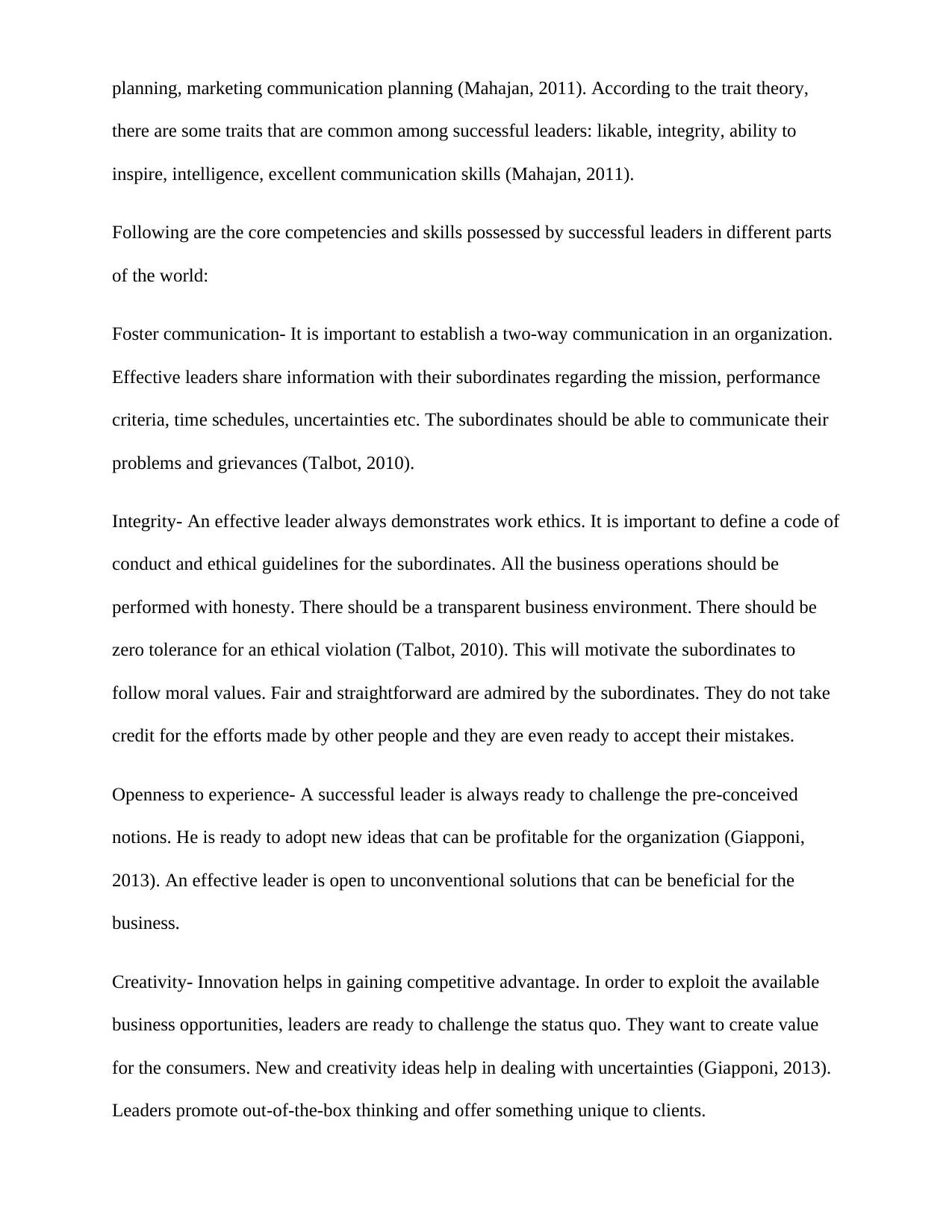
planning, marketing communication planning (Mahajan, 2011). According to the trait theory,
there are some traits that are common among successful leaders: likable, integrity, ability to
inspire, intelligence, excellent communication skills (Mahajan, 2011).
Following are the core competencies and skills possessed by successful leaders in different parts
of the world:
Foster communication- It is important to establish a two-way communication in an organization.
Effective leaders share information with their subordinates regarding the mission, performance
criteria, time schedules, uncertainties etc. The subordinates should be able to communicate their
problems and grievances (Talbot, 2010).
Integrity- An effective leader always demonstrates work ethics. It is important to define a code of
conduct and ethical guidelines for the subordinates. All the business operations should be
performed with honesty. There should be a transparent business environment. There should be
zero tolerance for an ethical violation (Talbot, 2010). This will motivate the subordinates to
follow moral values. Fair and straightforward are admired by the subordinates. They do not take
credit for the efforts made by other people and they are even ready to accept their mistakes.
Openness to experience- A successful leader is always ready to challenge the pre-conceived
notions. He is ready to adopt new ideas that can be profitable for the organization (Giapponi,
2013). An effective leader is open to unconventional solutions that can be beneficial for the
business.
Creativity- Innovation helps in gaining competitive advantage. In order to exploit the available
business opportunities, leaders are ready to challenge the status quo. They want to create value
for the consumers. New and creativity ideas help in dealing with uncertainties (Giapponi, 2013).
Leaders promote out-of-the-box thinking and offer something unique to clients.
there are some traits that are common among successful leaders: likable, integrity, ability to
inspire, intelligence, excellent communication skills (Mahajan, 2011).
Following are the core competencies and skills possessed by successful leaders in different parts
of the world:
Foster communication- It is important to establish a two-way communication in an organization.
Effective leaders share information with their subordinates regarding the mission, performance
criteria, time schedules, uncertainties etc. The subordinates should be able to communicate their
problems and grievances (Talbot, 2010).
Integrity- An effective leader always demonstrates work ethics. It is important to define a code of
conduct and ethical guidelines for the subordinates. All the business operations should be
performed with honesty. There should be a transparent business environment. There should be
zero tolerance for an ethical violation (Talbot, 2010). This will motivate the subordinates to
follow moral values. Fair and straightforward are admired by the subordinates. They do not take
credit for the efforts made by other people and they are even ready to accept their mistakes.
Openness to experience- A successful leader is always ready to challenge the pre-conceived
notions. He is ready to adopt new ideas that can be profitable for the organization (Giapponi,
2013). An effective leader is open to unconventional solutions that can be beneficial for the
business.
Creativity- Innovation helps in gaining competitive advantage. In order to exploit the available
business opportunities, leaders are ready to challenge the status quo. They want to create value
for the consumers. New and creativity ideas help in dealing with uncertainties (Giapponi, 2013).
Leaders promote out-of-the-box thinking and offer something unique to clients.
Paraphrase This Document
Need a fresh take? Get an instant paraphrase of this document with our AI Paraphraser
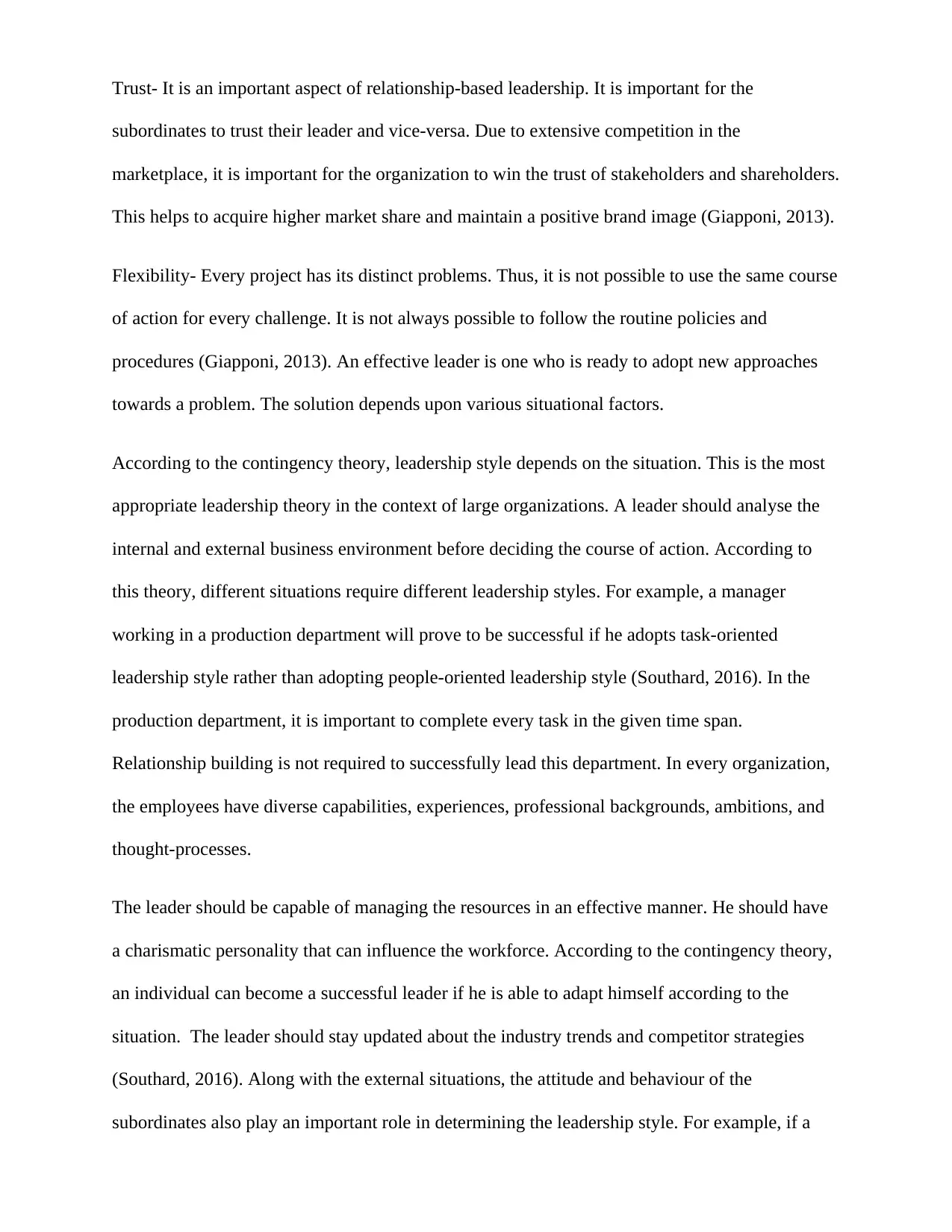
Trust- It is an important aspect of relationship-based leadership. It is important for the
subordinates to trust their leader and vice-versa. Due to extensive competition in the
marketplace, it is important for the organization to win the trust of stakeholders and shareholders.
This helps to acquire higher market share and maintain a positive brand image (Giapponi, 2013).
Flexibility- Every project has its distinct problems. Thus, it is not possible to use the same course
of action for every challenge. It is not always possible to follow the routine policies and
procedures (Giapponi, 2013). An effective leader is one who is ready to adopt new approaches
towards a problem. The solution depends upon various situational factors.
According to the contingency theory, leadership style depends on the situation. This is the most
appropriate leadership theory in the context of large organizations. A leader should analyse the
internal and external business environment before deciding the course of action. According to
this theory, different situations require different leadership styles. For example, a manager
working in a production department will prove to be successful if he adopts task-oriented
leadership style rather than adopting people-oriented leadership style (Southard, 2016). In the
production department, it is important to complete every task in the given time span.
Relationship building is not required to successfully lead this department. In every organization,
the employees have diverse capabilities, experiences, professional backgrounds, ambitions, and
thought-processes.
The leader should be capable of managing the resources in an effective manner. He should have
a charismatic personality that can influence the workforce. According to the contingency theory,
an individual can become a successful leader if he is able to adapt himself according to the
situation. The leader should stay updated about the industry trends and competitor strategies
(Southard, 2016). Along with the external situations, the attitude and behaviour of the
subordinates also play an important role in determining the leadership style. For example, if a
subordinates to trust their leader and vice-versa. Due to extensive competition in the
marketplace, it is important for the organization to win the trust of stakeholders and shareholders.
This helps to acquire higher market share and maintain a positive brand image (Giapponi, 2013).
Flexibility- Every project has its distinct problems. Thus, it is not possible to use the same course
of action for every challenge. It is not always possible to follow the routine policies and
procedures (Giapponi, 2013). An effective leader is one who is ready to adopt new approaches
towards a problem. The solution depends upon various situational factors.
According to the contingency theory, leadership style depends on the situation. This is the most
appropriate leadership theory in the context of large organizations. A leader should analyse the
internal and external business environment before deciding the course of action. According to
this theory, different situations require different leadership styles. For example, a manager
working in a production department will prove to be successful if he adopts task-oriented
leadership style rather than adopting people-oriented leadership style (Southard, 2016). In the
production department, it is important to complete every task in the given time span.
Relationship building is not required to successfully lead this department. In every organization,
the employees have diverse capabilities, experiences, professional backgrounds, ambitions, and
thought-processes.
The leader should be capable of managing the resources in an effective manner. He should have
a charismatic personality that can influence the workforce. According to the contingency theory,
an individual can become a successful leader if he is able to adapt himself according to the
situation. The leader should stay updated about the industry trends and competitor strategies
(Southard, 2016). Along with the external situations, the attitude and behaviour of the
subordinates also play an important role in determining the leadership style. For example, if a
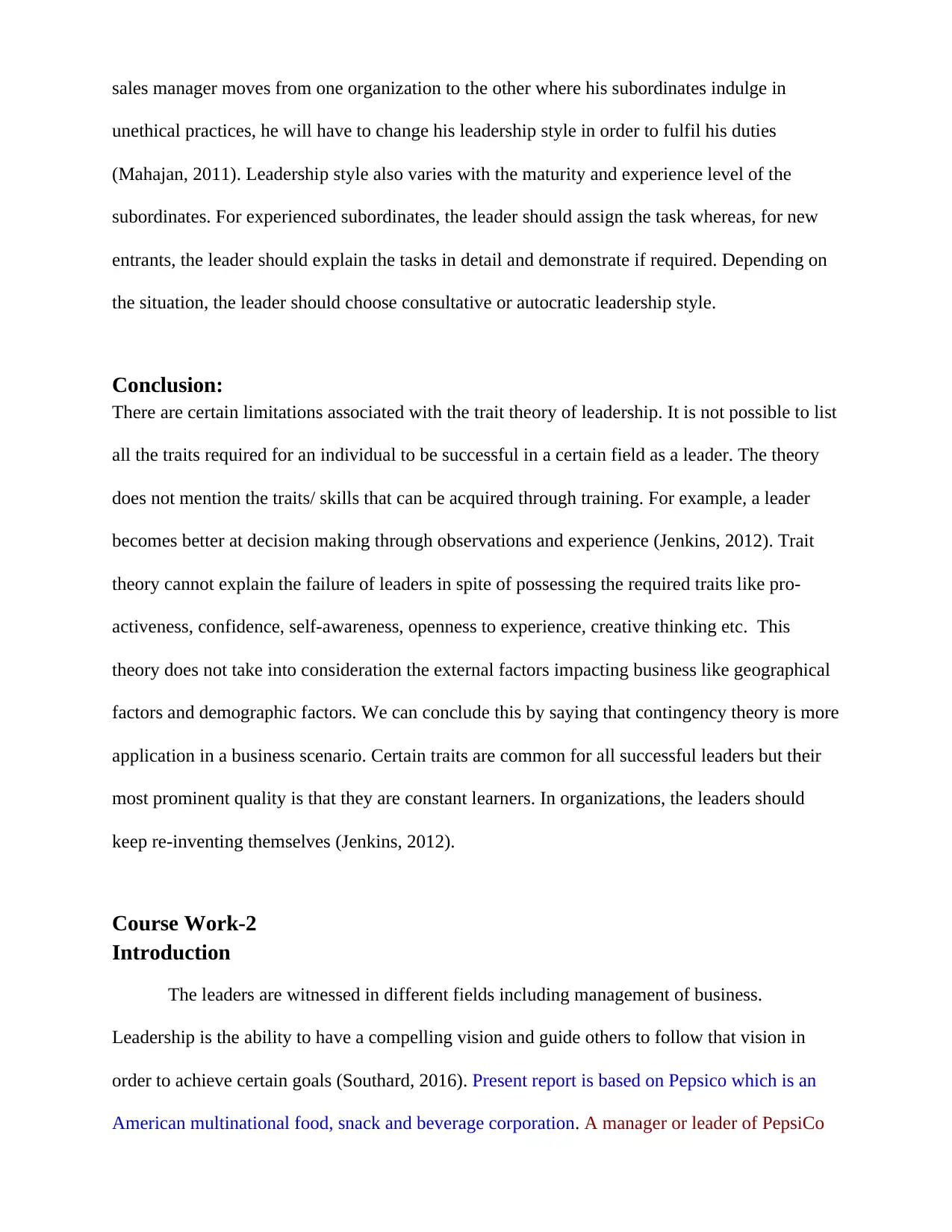
sales manager moves from one organization to the other where his subordinates indulge in
unethical practices, he will have to change his leadership style in order to fulfil his duties
(Mahajan, 2011). Leadership style also varies with the maturity and experience level of the
subordinates. For experienced subordinates, the leader should assign the task whereas, for new
entrants, the leader should explain the tasks in detail and demonstrate if required. Depending on
the situation, the leader should choose consultative or autocratic leadership style.
Conclusion:
There are certain limitations associated with the trait theory of leadership. It is not possible to list
all the traits required for an individual to be successful in a certain field as a leader. The theory
does not mention the traits/ skills that can be acquired through training. For example, a leader
becomes better at decision making through observations and experience (Jenkins, 2012). Trait
theory cannot explain the failure of leaders in spite of possessing the required traits like pro-
activeness, confidence, self-awareness, openness to experience, creative thinking etc. This
theory does not take into consideration the external factors impacting business like geographical
factors and demographic factors. We can conclude this by saying that contingency theory is more
application in a business scenario. Certain traits are common for all successful leaders but their
most prominent quality is that they are constant learners. In organizations, the leaders should
keep re-inventing themselves (Jenkins, 2012).
Course Work-2
Introduction
The leaders are witnessed in different fields including management of business.
Leadership is the ability to have a compelling vision and guide others to follow that vision in
order to achieve certain goals (Southard, 2016). Present report is based on Pepsico which is an
American multinational food, snack and beverage corporation. A manager or leader of PepsiCo
unethical practices, he will have to change his leadership style in order to fulfil his duties
(Mahajan, 2011). Leadership style also varies with the maturity and experience level of the
subordinates. For experienced subordinates, the leader should assign the task whereas, for new
entrants, the leader should explain the tasks in detail and demonstrate if required. Depending on
the situation, the leader should choose consultative or autocratic leadership style.
Conclusion:
There are certain limitations associated with the trait theory of leadership. It is not possible to list
all the traits required for an individual to be successful in a certain field as a leader. The theory
does not mention the traits/ skills that can be acquired through training. For example, a leader
becomes better at decision making through observations and experience (Jenkins, 2012). Trait
theory cannot explain the failure of leaders in spite of possessing the required traits like pro-
activeness, confidence, self-awareness, openness to experience, creative thinking etc. This
theory does not take into consideration the external factors impacting business like geographical
factors and demographic factors. We can conclude this by saying that contingency theory is more
application in a business scenario. Certain traits are common for all successful leaders but their
most prominent quality is that they are constant learners. In organizations, the leaders should
keep re-inventing themselves (Jenkins, 2012).
Course Work-2
Introduction
The leaders are witnessed in different fields including management of business.
Leadership is the ability to have a compelling vision and guide others to follow that vision in
order to achieve certain goals (Southard, 2016). Present report is based on Pepsico which is an
American multinational food, snack and beverage corporation. A manager or leader of PepsiCo
⊘ This is a preview!⊘
Do you want full access?
Subscribe today to unlock all pages.

Trusted by 1+ million students worldwide
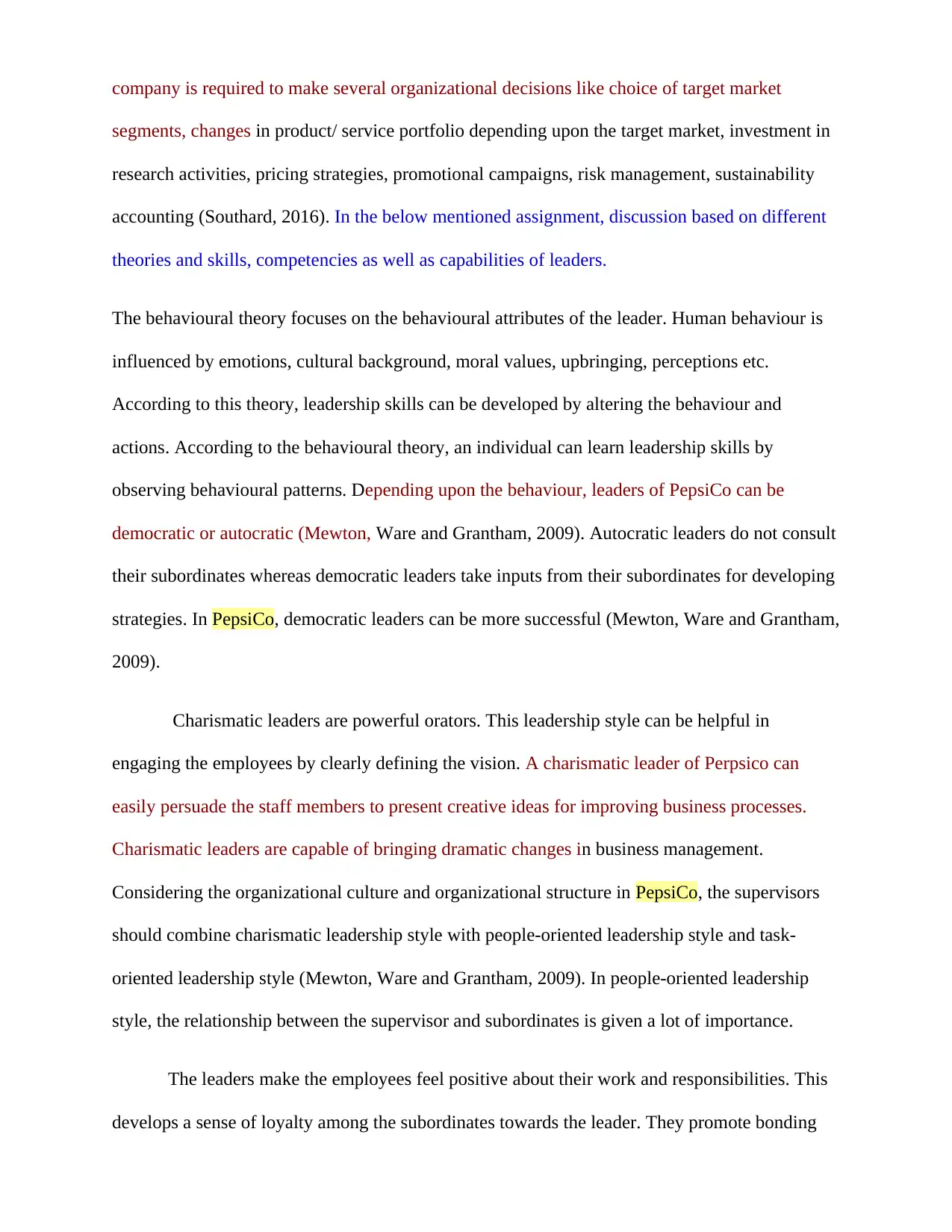
company is required to make several organizational decisions like choice of target market
segments, changes in product/ service portfolio depending upon the target market, investment in
research activities, pricing strategies, promotional campaigns, risk management, sustainability
accounting (Southard, 2016). In the below mentioned assignment, discussion based on different
theories and skills, competencies as well as capabilities of leaders.
The behavioural theory focuses on the behavioural attributes of the leader. Human behaviour is
influenced by emotions, cultural background, moral values, upbringing, perceptions etc.
According to this theory, leadership skills can be developed by altering the behaviour and
actions. According to the behavioural theory, an individual can learn leadership skills by
observing behavioural patterns. Depending upon the behaviour, leaders of PepsiCo can be
democratic or autocratic (Mewton, Ware and Grantham, 2009). Autocratic leaders do not consult
their subordinates whereas democratic leaders take inputs from their subordinates for developing
strategies. In PepsiCo, democratic leaders can be more successful (Mewton, Ware and Grantham,
2009).
Charismatic leaders are powerful orators. This leadership style can be helpful in
engaging the employees by clearly defining the vision. A charismatic leader of Perpsico can
easily persuade the staff members to present creative ideas for improving business processes.
Charismatic leaders are capable of bringing dramatic changes in business management.
Considering the organizational culture and organizational structure in PepsiCo, the supervisors
should combine charismatic leadership style with people-oriented leadership style and task-
oriented leadership style (Mewton, Ware and Grantham, 2009). In people-oriented leadership
style, the relationship between the supervisor and subordinates is given a lot of importance.
The leaders make the employees feel positive about their work and responsibilities. This
develops a sense of loyalty among the subordinates towards the leader. They promote bonding
segments, changes in product/ service portfolio depending upon the target market, investment in
research activities, pricing strategies, promotional campaigns, risk management, sustainability
accounting (Southard, 2016). In the below mentioned assignment, discussion based on different
theories and skills, competencies as well as capabilities of leaders.
The behavioural theory focuses on the behavioural attributes of the leader. Human behaviour is
influenced by emotions, cultural background, moral values, upbringing, perceptions etc.
According to this theory, leadership skills can be developed by altering the behaviour and
actions. According to the behavioural theory, an individual can learn leadership skills by
observing behavioural patterns. Depending upon the behaviour, leaders of PepsiCo can be
democratic or autocratic (Mewton, Ware and Grantham, 2009). Autocratic leaders do not consult
their subordinates whereas democratic leaders take inputs from their subordinates for developing
strategies. In PepsiCo, democratic leaders can be more successful (Mewton, Ware and Grantham,
2009).
Charismatic leaders are powerful orators. This leadership style can be helpful in
engaging the employees by clearly defining the vision. A charismatic leader of Perpsico can
easily persuade the staff members to present creative ideas for improving business processes.
Charismatic leaders are capable of bringing dramatic changes in business management.
Considering the organizational culture and organizational structure in PepsiCo, the supervisors
should combine charismatic leadership style with people-oriented leadership style and task-
oriented leadership style (Mewton, Ware and Grantham, 2009). In people-oriented leadership
style, the relationship between the supervisor and subordinates is given a lot of importance.
The leaders make the employees feel positive about their work and responsibilities. This
develops a sense of loyalty among the subordinates towards the leader. They promote bonding
Paraphrase This Document
Need a fresh take? Get an instant paraphrase of this document with our AI Paraphraser
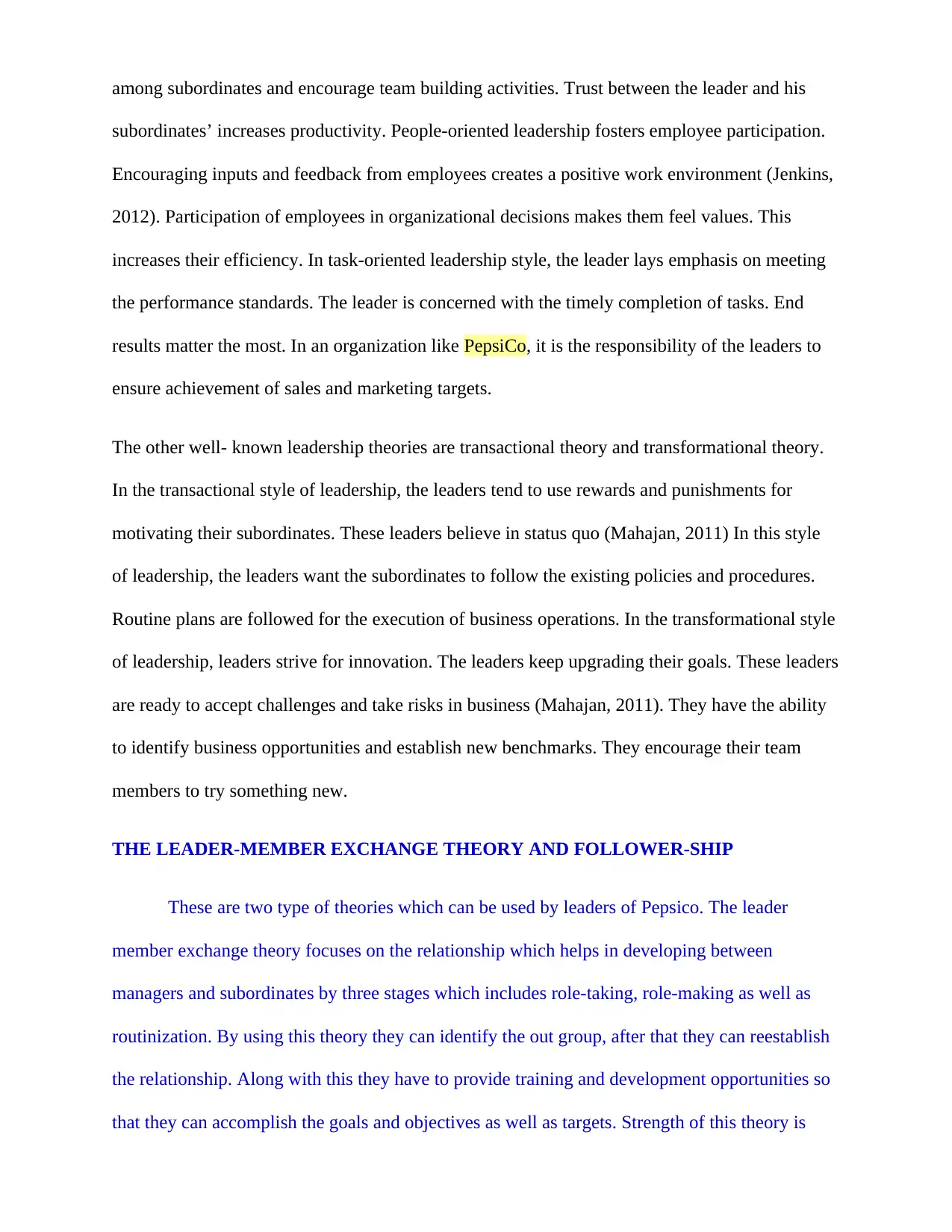
among subordinates and encourage team building activities. Trust between the leader and his
subordinates’ increases productivity. People-oriented leadership fosters employee participation.
Encouraging inputs and feedback from employees creates a positive work environment (Jenkins,
2012). Participation of employees in organizational decisions makes them feel values. This
increases their efficiency. In task-oriented leadership style, the leader lays emphasis on meeting
the performance standards. The leader is concerned with the timely completion of tasks. End
results matter the most. In an organization like PepsiCo, it is the responsibility of the leaders to
ensure achievement of sales and marketing targets.
The other well- known leadership theories are transactional theory and transformational theory.
In the transactional style of leadership, the leaders tend to use rewards and punishments for
motivating their subordinates. These leaders believe in status quo (Mahajan, 2011) In this style
of leadership, the leaders want the subordinates to follow the existing policies and procedures.
Routine plans are followed for the execution of business operations. In the transformational style
of leadership, leaders strive for innovation. The leaders keep upgrading their goals. These leaders
are ready to accept challenges and take risks in business (Mahajan, 2011). They have the ability
to identify business opportunities and establish new benchmarks. They encourage their team
members to try something new.
THE LEADER-MEMBER EXCHANGE THEORY AND FOLLOWER-SHIP
These are two type of theories which can be used by leaders of Pepsico. The leader
member exchange theory focuses on the relationship which helps in developing between
managers and subordinates by three stages which includes role-taking, role-making as well as
routinization. By using this theory they can identify the out group, after that they can reestablish
the relationship. Along with this they have to provide training and development opportunities so
that they can accomplish the goals and objectives as well as targets. Strength of this theory is
subordinates’ increases productivity. People-oriented leadership fosters employee participation.
Encouraging inputs and feedback from employees creates a positive work environment (Jenkins,
2012). Participation of employees in organizational decisions makes them feel values. This
increases their efficiency. In task-oriented leadership style, the leader lays emphasis on meeting
the performance standards. The leader is concerned with the timely completion of tasks. End
results matter the most. In an organization like PepsiCo, it is the responsibility of the leaders to
ensure achievement of sales and marketing targets.
The other well- known leadership theories are transactional theory and transformational theory.
In the transactional style of leadership, the leaders tend to use rewards and punishments for
motivating their subordinates. These leaders believe in status quo (Mahajan, 2011) In this style
of leadership, the leaders want the subordinates to follow the existing policies and procedures.
Routine plans are followed for the execution of business operations. In the transformational style
of leadership, leaders strive for innovation. The leaders keep upgrading their goals. These leaders
are ready to accept challenges and take risks in business (Mahajan, 2011). They have the ability
to identify business opportunities and establish new benchmarks. They encourage their team
members to try something new.
THE LEADER-MEMBER EXCHANGE THEORY AND FOLLOWER-SHIP
These are two type of theories which can be used by leaders of Pepsico. The leader
member exchange theory focuses on the relationship which helps in developing between
managers and subordinates by three stages which includes role-taking, role-making as well as
routinization. By using this theory they can identify the out group, after that they can reestablish
the relationship. Along with this they have to provide training and development opportunities so
that they can accomplish the goals and objectives as well as targets. Strength of this theory is
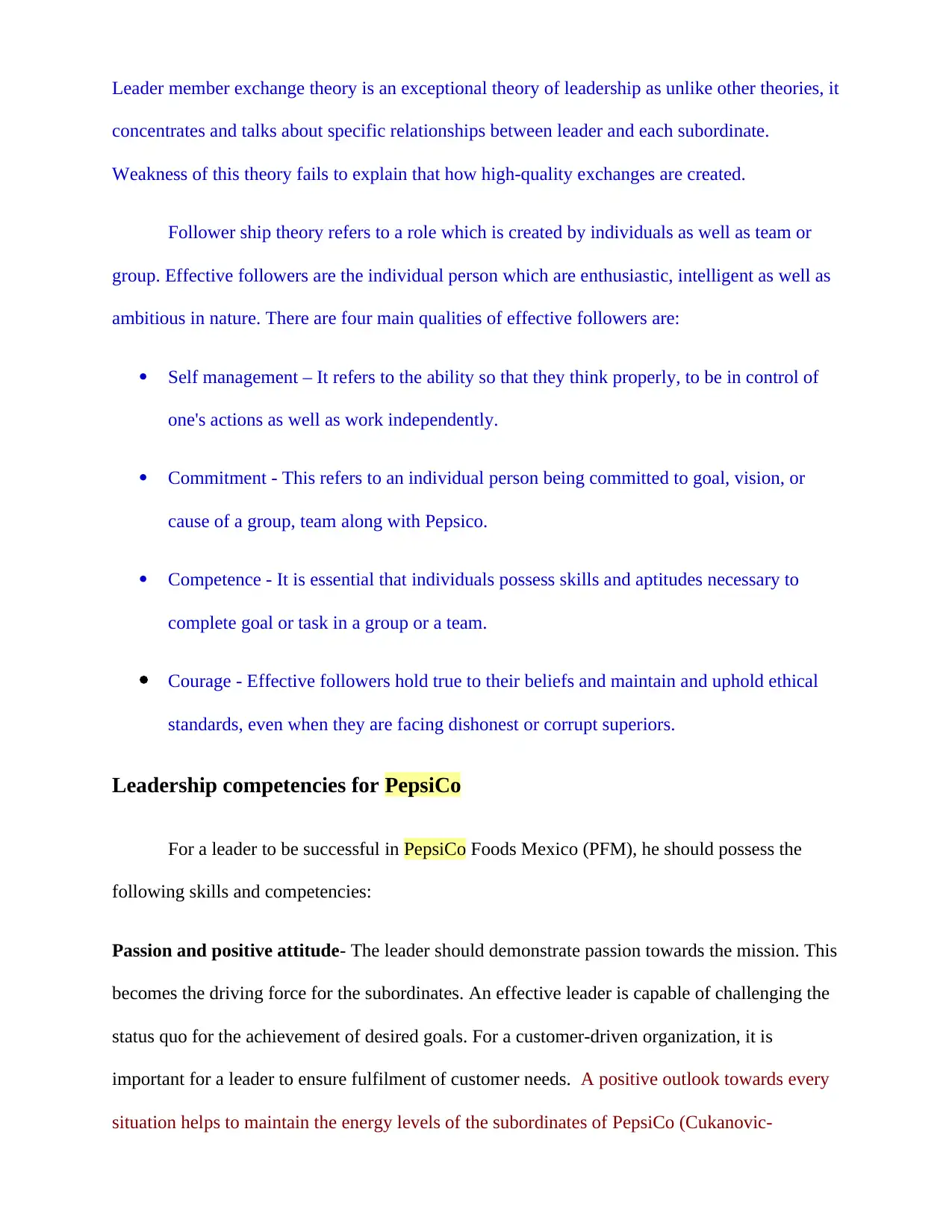
Leader member exchange theory is an exceptional theory of leadership as unlike other theories, it
concentrates and talks about specific relationships between leader and each subordinate.
Weakness of this theory fails to explain that how high-quality exchanges are created.
Follower ship theory refers to a role which is created by individuals as well as team or
group. Effective followers are the individual person which are enthusiastic, intelligent as well as
ambitious in nature. There are four main qualities of effective followers are:
Self management – It refers to the ability so that they think properly, to be in control of
one's actions as well as work independently.
Commitment - This refers to an individual person being committed to goal, vision, or
cause of a group, team along with Pepsico.
Competence - It is essential that individuals possess skills and aptitudes necessary to
complete goal or task in a group or a team.
Courage - Effective followers hold true to their beliefs and maintain and uphold ethical
standards, even when they are facing dishonest or corrupt superiors.
Leadership competencies for PepsiCo
For a leader to be successful in PepsiCo Foods Mexico (PFM), he should possess the
following skills and competencies:
Passion and positive attitude- The leader should demonstrate passion towards the mission. This
becomes the driving force for the subordinates. An effective leader is capable of challenging the
status quo for the achievement of desired goals. For a customer-driven organization, it is
important for a leader to ensure fulfilment of customer needs. A positive outlook towards every
situation helps to maintain the energy levels of the subordinates of PepsiCo (Cukanovic-
concentrates and talks about specific relationships between leader and each subordinate.
Weakness of this theory fails to explain that how high-quality exchanges are created.
Follower ship theory refers to a role which is created by individuals as well as team or
group. Effective followers are the individual person which are enthusiastic, intelligent as well as
ambitious in nature. There are four main qualities of effective followers are:
Self management – It refers to the ability so that they think properly, to be in control of
one's actions as well as work independently.
Commitment - This refers to an individual person being committed to goal, vision, or
cause of a group, team along with Pepsico.
Competence - It is essential that individuals possess skills and aptitudes necessary to
complete goal or task in a group or a team.
Courage - Effective followers hold true to their beliefs and maintain and uphold ethical
standards, even when they are facing dishonest or corrupt superiors.
Leadership competencies for PepsiCo
For a leader to be successful in PepsiCo Foods Mexico (PFM), he should possess the
following skills and competencies:
Passion and positive attitude- The leader should demonstrate passion towards the mission. This
becomes the driving force for the subordinates. An effective leader is capable of challenging the
status quo for the achievement of desired goals. For a customer-driven organization, it is
important for a leader to ensure fulfilment of customer needs. A positive outlook towards every
situation helps to maintain the energy levels of the subordinates of PepsiCo (Cukanovic-
⊘ This is a preview!⊘
Do you want full access?
Subscribe today to unlock all pages.

Trusted by 1+ million students worldwide
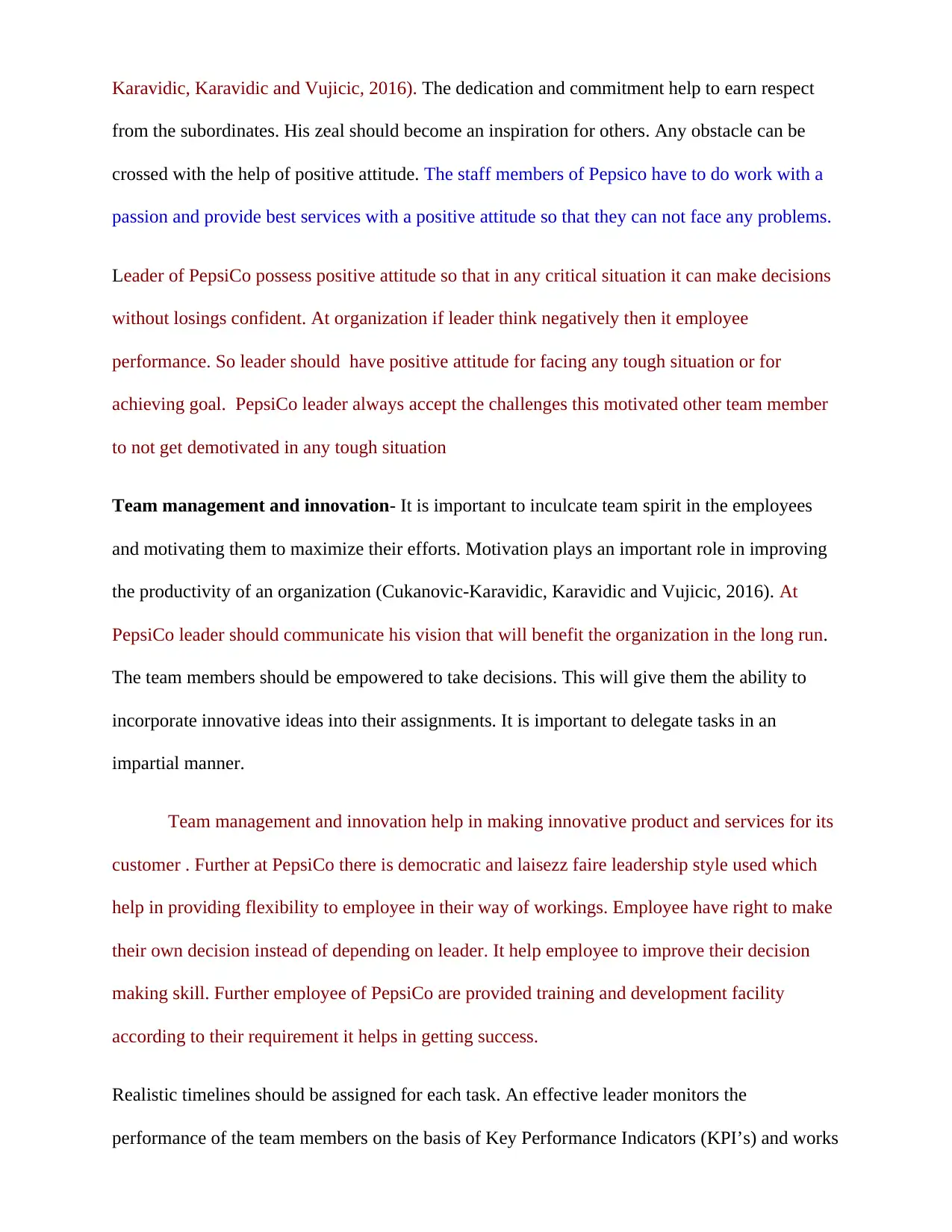
Karavidic, Karavidic and Vujicic, 2016). The dedication and commitment help to earn respect
from the subordinates. His zeal should become an inspiration for others. Any obstacle can be
crossed with the help of positive attitude. The staff members of Pepsico have to do work with a
passion and provide best services with a positive attitude so that they can not face any problems.
Leader of PepsiCo possess positive attitude so that in any critical situation it can make decisions
without losings confident. At organization if leader think negatively then it employee
performance. So leader should have positive attitude for facing any tough situation or for
achieving goal. PepsiCo leader always accept the challenges this motivated other team member
to not get demotivated in any tough situation
Team management and innovation- It is important to inculcate team spirit in the employees
and motivating them to maximize their efforts. Motivation plays an important role in improving
the productivity of an organization (Cukanovic-Karavidic, Karavidic and Vujicic, 2016). At
PepsiCo leader should communicate his vision that will benefit the organization in the long run.
The team members should be empowered to take decisions. This will give them the ability to
incorporate innovative ideas into their assignments. It is important to delegate tasks in an
impartial manner.
Team management and innovation help in making innovative product and services for its
customer . Further at PepsiCo there is democratic and laisezz faire leadership style used which
help in providing flexibility to employee in their way of workings. Employee have right to make
their own decision instead of depending on leader. It help employee to improve their decision
making skill. Further employee of PepsiCo are provided training and development facility
according to their requirement it helps in getting success.
Realistic timelines should be assigned for each task. An effective leader monitors the
performance of the team members on the basis of Key Performance Indicators (KPI’s) and works
from the subordinates. His zeal should become an inspiration for others. Any obstacle can be
crossed with the help of positive attitude. The staff members of Pepsico have to do work with a
passion and provide best services with a positive attitude so that they can not face any problems.
Leader of PepsiCo possess positive attitude so that in any critical situation it can make decisions
without losings confident. At organization if leader think negatively then it employee
performance. So leader should have positive attitude for facing any tough situation or for
achieving goal. PepsiCo leader always accept the challenges this motivated other team member
to not get demotivated in any tough situation
Team management and innovation- It is important to inculcate team spirit in the employees
and motivating them to maximize their efforts. Motivation plays an important role in improving
the productivity of an organization (Cukanovic-Karavidic, Karavidic and Vujicic, 2016). At
PepsiCo leader should communicate his vision that will benefit the organization in the long run.
The team members should be empowered to take decisions. This will give them the ability to
incorporate innovative ideas into their assignments. It is important to delegate tasks in an
impartial manner.
Team management and innovation help in making innovative product and services for its
customer . Further at PepsiCo there is democratic and laisezz faire leadership style used which
help in providing flexibility to employee in their way of workings. Employee have right to make
their own decision instead of depending on leader. It help employee to improve their decision
making skill. Further employee of PepsiCo are provided training and development facility
according to their requirement it helps in getting success.
Realistic timelines should be assigned for each task. An effective leader monitors the
performance of the team members on the basis of Key Performance Indicators (KPI’s) and works
Paraphrase This Document
Need a fresh take? Get an instant paraphrase of this document with our AI Paraphraser
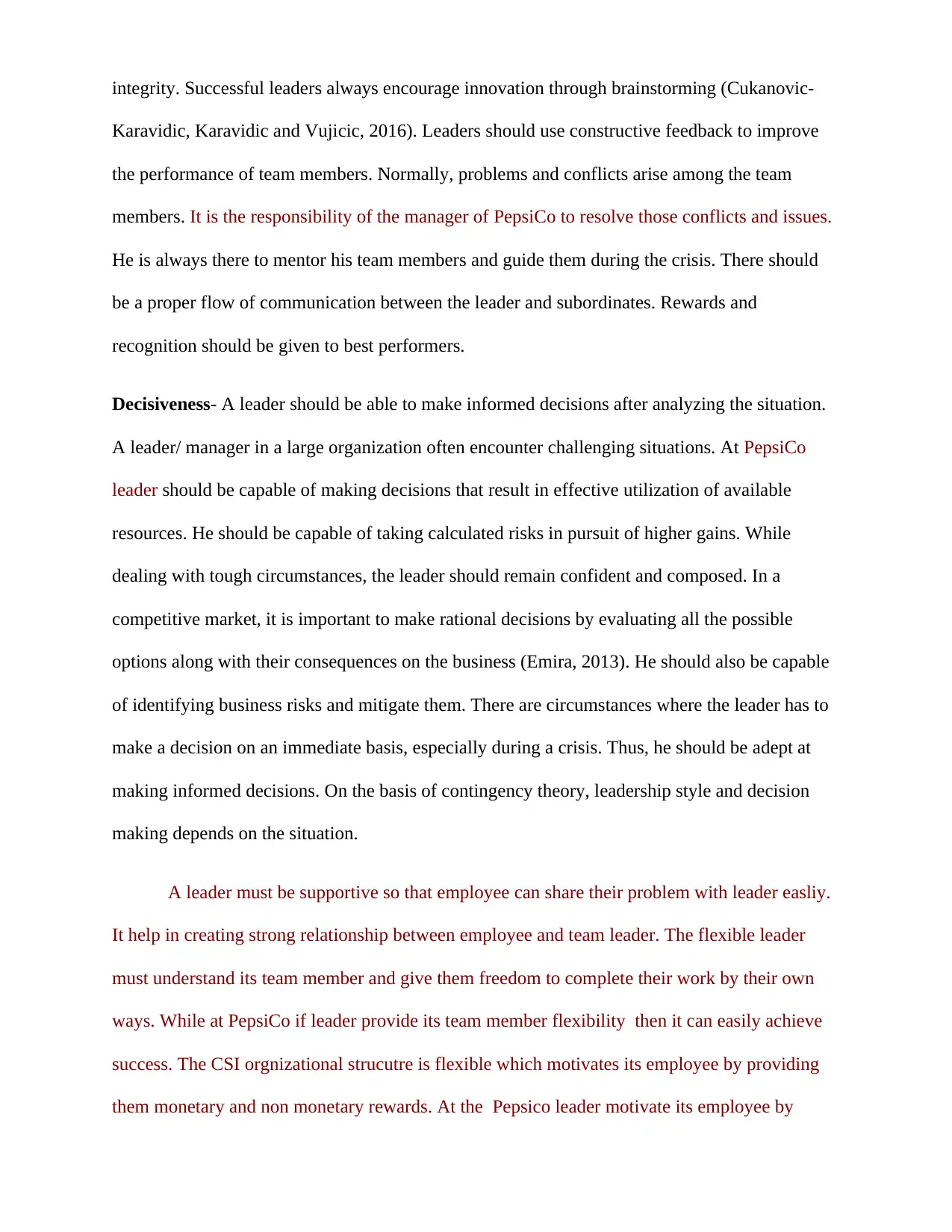
integrity. Successful leaders always encourage innovation through brainstorming (Cukanovic-
Karavidic, Karavidic and Vujicic, 2016). Leaders should use constructive feedback to improve
the performance of team members. Normally, problems and conflicts arise among the team
members. It is the responsibility of the manager of PepsiCo to resolve those conflicts and issues.
He is always there to mentor his team members and guide them during the crisis. There should
be a proper flow of communication between the leader and subordinates. Rewards and
recognition should be given to best performers.
Decisiveness- A leader should be able to make informed decisions after analyzing the situation.
A leader/ manager in a large organization often encounter challenging situations. At PepsiCo
leader should be capable of making decisions that result in effective utilization of available
resources. He should be capable of taking calculated risks in pursuit of higher gains. While
dealing with tough circumstances, the leader should remain confident and composed. In a
competitive market, it is important to make rational decisions by evaluating all the possible
options along with their consequences on the business (Emira, 2013). He should also be capable
of identifying business risks and mitigate them. There are circumstances where the leader has to
make a decision on an immediate basis, especially during a crisis. Thus, he should be adept at
making informed decisions. On the basis of contingency theory, leadership style and decision
making depends on the situation.
A leader must be supportive so that employee can share their problem with leader easliy.
It help in creating strong relationship between employee and team leader. The flexible leader
must understand its team member and give them freedom to complete their work by their own
ways. While at PepsiCo if leader provide its team member flexibility then it can easily achieve
success. The CSI orgnizational strucutre is flexible which motivates its employee by providing
them monetary and non monetary rewards. At the Pepsico leader motivate its employee by
Karavidic, Karavidic and Vujicic, 2016). Leaders should use constructive feedback to improve
the performance of team members. Normally, problems and conflicts arise among the team
members. It is the responsibility of the manager of PepsiCo to resolve those conflicts and issues.
He is always there to mentor his team members and guide them during the crisis. There should
be a proper flow of communication between the leader and subordinates. Rewards and
recognition should be given to best performers.
Decisiveness- A leader should be able to make informed decisions after analyzing the situation.
A leader/ manager in a large organization often encounter challenging situations. At PepsiCo
leader should be capable of making decisions that result in effective utilization of available
resources. He should be capable of taking calculated risks in pursuit of higher gains. While
dealing with tough circumstances, the leader should remain confident and composed. In a
competitive market, it is important to make rational decisions by evaluating all the possible
options along with their consequences on the business (Emira, 2013). He should also be capable
of identifying business risks and mitigate them. There are circumstances where the leader has to
make a decision on an immediate basis, especially during a crisis. Thus, he should be adept at
making informed decisions. On the basis of contingency theory, leadership style and decision
making depends on the situation.
A leader must be supportive so that employee can share their problem with leader easliy.
It help in creating strong relationship between employee and team leader. The flexible leader
must understand its team member and give them freedom to complete their work by their own
ways. While at PepsiCo if leader provide its team member flexibility then it can easily achieve
success. The CSI orgnizational strucutre is flexible which motivates its employee by providing
them monetary and non monetary rewards. At the Pepsico leader motivate its employee by
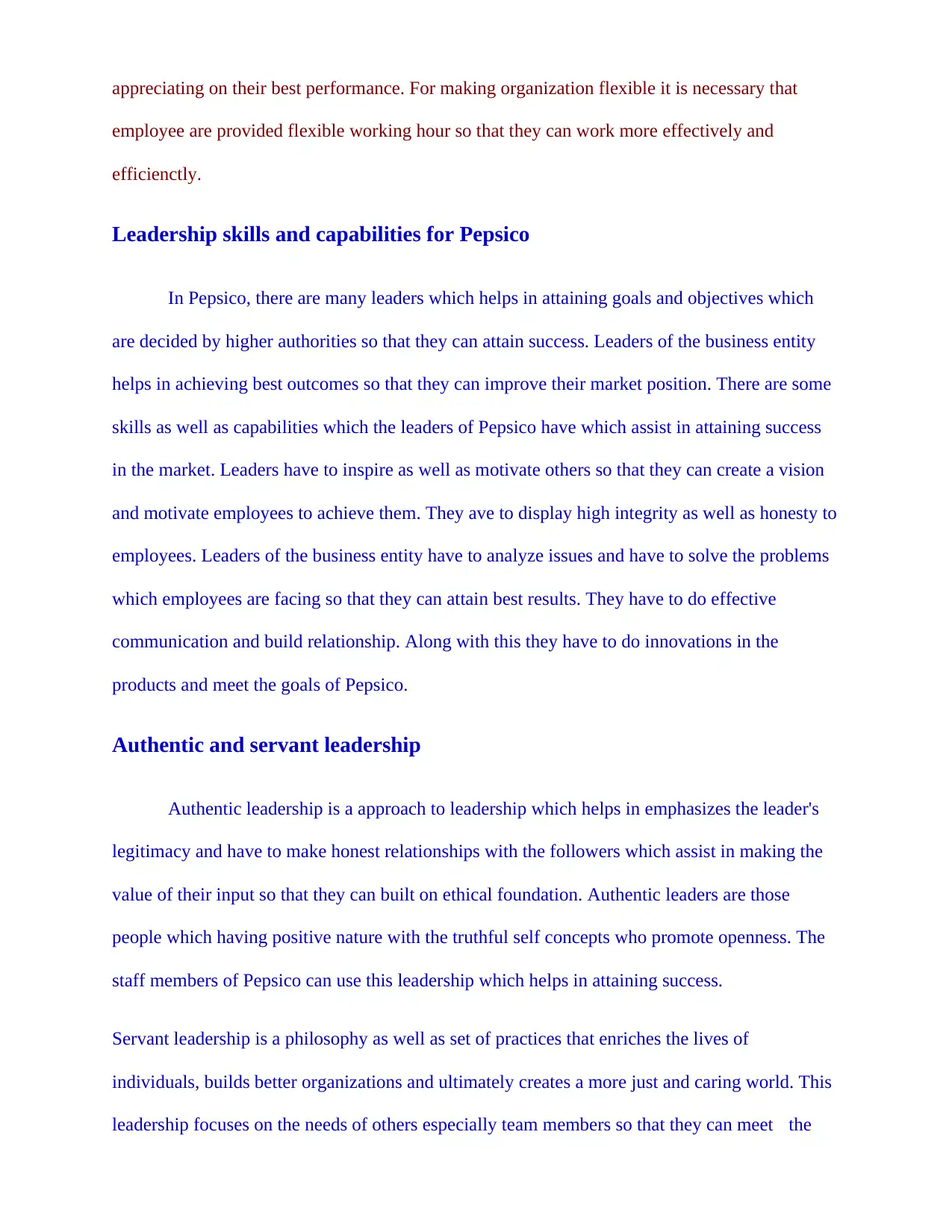
appreciating on their best performance. For making organization flexible it is necessary that
employee are provided flexible working hour so that they can work more effectively and
efficienctly.
Leadership skills and capabilities for Pepsico
In Pepsico, there are many leaders which helps in attaining goals and objectives which
are decided by higher authorities so that they can attain success. Leaders of the business entity
helps in achieving best outcomes so that they can improve their market position. There are some
skills as well as capabilities which the leaders of Pepsico have which assist in attaining success
in the market. Leaders have to inspire as well as motivate others so that they can create a vision
and motivate employees to achieve them. They ave to display high integrity as well as honesty to
employees. Leaders of the business entity have to analyze issues and have to solve the problems
which employees are facing so that they can attain best results. They have to do effective
communication and build relationship. Along with this they have to do innovations in the
products and meet the goals of Pepsico.
Authentic and servant leadership
Authentic leadership is a approach to leadership which helps in emphasizes the leader's
legitimacy and have to make honest relationships with the followers which assist in making the
value of their input so that they can built on ethical foundation. Authentic leaders are those
people which having positive nature with the truthful self concepts who promote openness. The
staff members of Pepsico can use this leadership which helps in attaining success.
Servant leadership is a philosophy as well as set of practices that enriches the lives of
individuals, builds better organizations and ultimately creates a more just and caring world. This
leadership focuses on the needs of others especially team members so that they can meet the
employee are provided flexible working hour so that they can work more effectively and
efficienctly.
Leadership skills and capabilities for Pepsico
In Pepsico, there are many leaders which helps in attaining goals and objectives which
are decided by higher authorities so that they can attain success. Leaders of the business entity
helps in achieving best outcomes so that they can improve their market position. There are some
skills as well as capabilities which the leaders of Pepsico have which assist in attaining success
in the market. Leaders have to inspire as well as motivate others so that they can create a vision
and motivate employees to achieve them. They ave to display high integrity as well as honesty to
employees. Leaders of the business entity have to analyze issues and have to solve the problems
which employees are facing so that they can attain best results. They have to do effective
communication and build relationship. Along with this they have to do innovations in the
products and meet the goals of Pepsico.
Authentic and servant leadership
Authentic leadership is a approach to leadership which helps in emphasizes the leader's
legitimacy and have to make honest relationships with the followers which assist in making the
value of their input so that they can built on ethical foundation. Authentic leaders are those
people which having positive nature with the truthful self concepts who promote openness. The
staff members of Pepsico can use this leadership which helps in attaining success.
Servant leadership is a philosophy as well as set of practices that enriches the lives of
individuals, builds better organizations and ultimately creates a more just and caring world. This
leadership focuses on the needs of others especially team members so that they can meet the
⊘ This is a preview!⊘
Do you want full access?
Subscribe today to unlock all pages.

Trusted by 1+ million students worldwide
1 out of 14
Related Documents
Your All-in-One AI-Powered Toolkit for Academic Success.
+13062052269
info@desklib.com
Available 24*7 on WhatsApp / Email
![[object Object]](/_next/static/media/star-bottom.7253800d.svg)
Unlock your academic potential
Copyright © 2020–2025 A2Z Services. All Rights Reserved. Developed and managed by ZUCOL.




